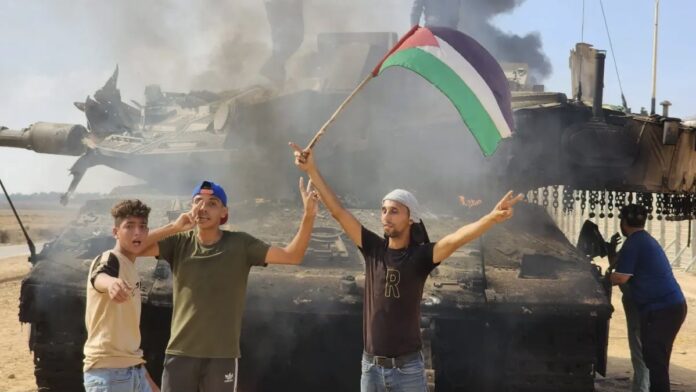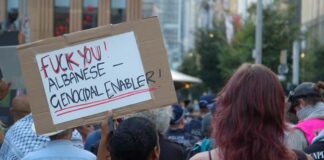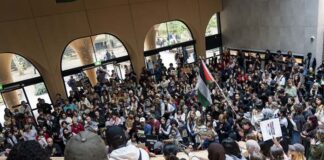Western leaders have denounced Hamas as terrorists following their attack on Israel. Israeli President Benjamin Netanyahu has vowed to wipe them “off the face of the Earth”.
But Hamas is a major part of the Palestinian resistance movement that has opposed Israeli settler-colonialism for decades. This is a national liberation struggle like those that ended European colonial control of Vietnam, Algeria or Zimbabwe.
Palestinians who were ethnically cleansed when Israel was established in 1948 have lived for generations in refugee camps. They are subject to daily humiliation and murder at the hands of Israeli occupying soldiers.
Hamas was founded during the first Palestinian intifada, or uprising, in 1987. Its name comes from an acronym in Arabic for the Islamic Resistance Movement.
The traditional party of Palestinian national liberation was Fatah, which began organising guerilla attacks on Israel from bases in Jordan and Lebanon in the 1960s.
But in 1993 Fatah entered the Oslo Process with Israel, a series of negotiations that were supposed to lead to a Palestinian state. Fatah was discredited by the continual compromises with Israel this involved.
All through the negotiations in the 1990s Israel built more settlements in the Occupied Territories.
Fatah became a collaborator with Israel’s occupation, agreeing to police Palestinian resistance through its control of the Palestinian Authority. Hamas rejected the Oslo Accords as a dead end.
In 2000 a second Palestinian Intifada erupted. Israel continually opened fire on mass demonstrations, answering the throwing of stones with live ammunition. In the first five days 47 Palestinians were killed. Tanks and helicopter gunships were regularly used against Palestinian homes, with at least 4973 Palestinians killed over five years.
Israel’s violence led Palestinians to turn increasingly to armed struggle and suicide bombings, with Hamas playing a leading role.
Its opposition to Fatah’s concessions to Israel and its role in resisting the occupation saw Hamas win the elections for the Palestinian Authority in the West Bank and Gaza in 2006.
The West responded by refusing to acknowledge the Palestinians’ democratic decision. Israel and the US supported a coup by Fatah in the West Bank against Hamas, but it was able to maintain control in the Gaza strip.
Israel responded by imposing a ruthless blockade of Gaza.
Hamas has used authoritarian methods to maintain control in Gaza. But its resistance to Israel continues to hold strong Palestinian support. Even their bitter rival Mahmoud Abbas, President of the Palestinian Authority and a member of Fatah, has been reluctant to condemn the recent Hamas attack on Israel.
Israel has imposed an unrelenting regime of suffering, terror and death on Gaza for the last 17 years. Palestinians are right to resist.
By James Supple






